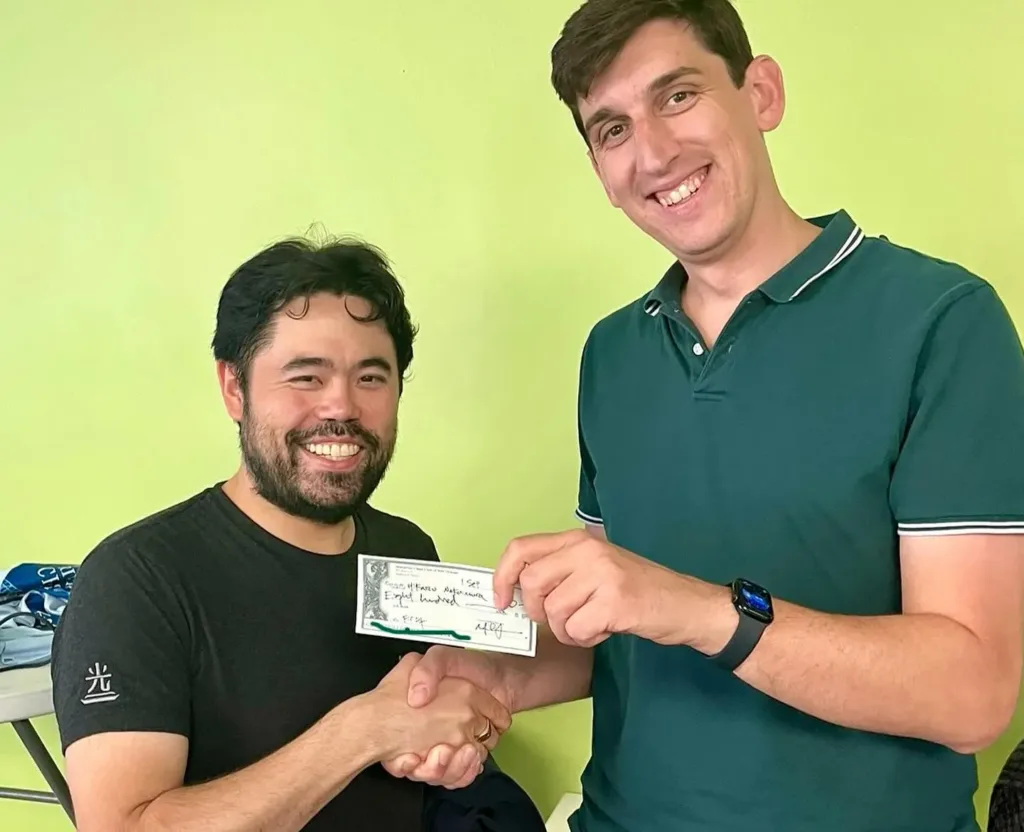Grandmaster Hikaru Nakamura was untouchable in New Orleans. The world number three entered the 2025 Louisiana State Championship at the last minute and stormed through the seven-round Swiss with a perfect 7/7 score, defeating opponents rated between 1563 and 2344.
The result was never in doubt. Nakamura, rated 2807 FIDE entering the event, opened with a win against Harry James (1563), then dispatched Mitchell Costanza (1812), Nahum Jose Villamil (1933), and Ralph Tan (2224) in successive rounds. He then beat Mark Schulingkamp (2088), FM Nicholas Matta (2250), and closed with CM Charles Campbell (2138). Not a single half-point was conceded.
His dominant run lifted his live rating by 4.8 points to 2811.8, edging closer to his career high of 2816, and solidifying his position as world number two behind Magnus Carlsen (2839).
A World-Class Player in a Local Hall
For Louisiana’s chess community, the weekend was surreal. Normally, the state championship offers a mix of local experts, masters, and ambitious amateurs. But this year, players found themselves sitting across from one of the most famous grandmasters alive.
“You don’t expect to play Hikaru at your state championship,” one participant said. “For us, it’s like Lionel Messi showing up to a Sunday league game.”
The final standings reflected Nakamura’s dominance:
- 1. GM Hikaru Nakamura (2807) – 7.0/7
- 2. Vijay Srinivas Anandh (2265) – 6.0/7
- 3. Ralph Tan (2224) – 6.0/7
- 4. FM Nicholas Matta (2344) – 5.5/7
- 5. Oshrie Jhames Reyes (1730) – 5.5/7
The $800 first prize was trivial compared to Nakamura’s online streaming revenue, but the opportunity to fulfill a much bigger goal explained his presence in New Orleans.
Why Louisiana? The Candidates Equation
The answer lies in the complicated rules of qualification for the Candidates Tournament, the event that determines who challenges for the world chess championship. One of the eight spots is awarded to the player with the highest average rating over six months, provided they have played at least 40 rated classical games during that period.
Nakamura, currently the top eligible player, had only 18 games before August. He needs more than 20 additional games by January 1, 2026, to remain eligible.
The Louisiana State Championship offered six rated games: low risk, but enough to chip away at the requirement. “In order to be eligible to qualify for the FIDE Candidates, I need to play 40 classical games,” Nakamura explained in his recap. “I settled on competing here in Louisiana as a fun way to get those games.”
The choice reflects a strategy. By playing in state-level tournaments against much lower-rated opposition, Nakamura minimizes the risk of rating losses while building up his game count.
Online Reactions: Farming or Fair Play?
The sight of a 2800-rated grandmaster facing 1800- and 2000-rated opponents ignited debate online. On Reddit, some questioned whether non-residents should even be allowed to influence a state championship.
“He’s not eligible for the state champion title, that goes to the highest Louisiana resident,” one user pointed out. Organizers confirmed this has always been the rule: the top resident claims the state title, while non-residents are welcome to compete.
Others focused on the bigger picture. “Ok somebody please explain to me why he’s doing this?” one commenter asked. Replies quickly filled in the details: he needs 40 games to qualify for the Candidates via the rating spot.
“Hikaru is aiming to qualify via the rating spot,” another wrote. “There isn’t really any stipulation on what the opponent’s ratings need to be, so it’s easier to just sign up for state championships than play high-level opens.”
Some bristled at the optics. “To clarify, it’s not farming for Elo, it’s farming for the 40 required games,” one user explained. Another added: “He entered a tournament without GMs or IMs to minimize risk, though he would have to win all the games outright to avoid losing points.”
Levy Rozman: “Chess Drama Is Back on the Menu”
The loudest voice came from International Master Levy Rozman, better known as GothamChess. In a widely watched video, he called the Louisiana appearance the latest example of how flawed the rating-spot rule is.
“For every win Hikaru gets, he’s gaining 0.8 rating points,” Rozman said. “It used to be you only get that once per tournament, but in 2024 FIDE changed the rule. So technically, Hikaru could keep doing this, and he’s only 29 points behind Magnus. Do you understand how crazy that is?”
Rozman was careful to separate Nakamura from the system. “People are not as aggressively going after Hikaru as they are going after the rating spot. He’s just playing by the rules. The issue is the rules themselves.”
What It Means
For Nakamura, the Louisiana sweep is step one in a months-long campaign. He now has 24 games, still short of the 40 required. More state tournaments or smaller opens may be in his future. Each event pushes him closer to eligibility and potentially, to the world number one spot if he maintains perfect scores.
For the Louisiana players, the weekend was unforgettable. Facing Nakamura, analyzing games with him in the skittles room, or simply watching him in the hall turned a $3,000 prize fund tournament into a global talking point.
The Candidates debate will continue, but for now the scoreboard is simple: Hikaru Nakamura, 7/7 in New Orleans.
FAQs
1. Why did Hikaru Nakamura play in the Louisiana State Championship?
Nakamura needed rated classical games to stay eligible for the 2026 Candidates Tournament. With limited elite tournaments available in the U.S., entering a state-level event gave him the chance to secure those games quickly.
2. Isn’t it unusual for a top-three player in the world to play a small state championship?
Extremely unusual. It’s like Lionel Messi joining a local Sunday league match. Most top grandmasters only compete in elite super-tournaments.
3. Who did Hikaru face in Louisiana?
Mostly local players with ratings between 1500 and 2300. For context, Hikaru is rated around 2800. That’s like an NBA All-Star playing against college kids.
4. Did Nakamura crush everyone easily?
Yes, he won the tournament without much trouble. But the real “game” wasn’t about winning. It was about ticking the FIDE box for classical games played.
5. Why did people call this ‘rating farming’?
Critics argue Hikaru played against much weaker opponents just to secure rating stability and Candidates eligibility. Supporters counter that he followed the rules available to everyone.
6. What did Hikaru himself say about it?
On stream, he joked about the absurdity of the situation and acknowledged that the chess world would make drama out of it. He also emphasized that he didn’t “need” the points, just the games.
7. How did the local Louisiana players react?
Many were thrilled to sit across from a world-class legend. For them, it was a once-in-a-lifetime chance to play against one of the best of all time.
8. Did Hikaru risk his rating by playing?
Yes. Playing against lower-rated opponents is risky, one slip-up could cost him big rating points. But he trusted himself to win cleanly.
9. Could this set a precedent for other top players?
Possibly. If FIDE doesn’t adjust the rules, more super GMs might “dip down” into local events when they need games. Actually Ding Liren and Alireza Firouzja used to do that a couple of years ago.
10. What does this mean for Nakamura’s World Championship chances?
It keeps his path alive. Without these games, he risked being ineligible for the 2026 Candidates. Now he remains one of the frontrunners.
11. Why was the chess community so divided about this?
Because it touches the heart of competitive fairness: Should world-class players use small events to meet FIDE requirements, or should the rules be stricter?
12. Will Louisiana now be ‘famous’ in chess because of this?
Absolutely. For years to come, people will say: “Remember when Hikaru showed up in Louisiana?” It turned a local state championship into an international headline.

I’m a passionate board game enthusiast and a skilled player in chess, xiangqi and Go. Words for Attacking Chess since 2023. Ping me at Lichess for a game or chat.

